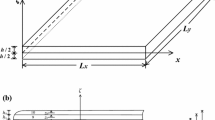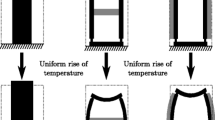Abstract
This paper presents a method for optimisation of the material composition of functionally graded materials (FGMs) for thermal stress relaxation. This method consists of a multiscale thermoelastic analysis and a genetic algorithm. In the presented method, location-dependent unit cells representing the microstructures of two-phase FGMs are created using morphology description functions, and the homogenised material properties and microscale thermal stresses are computed using the asymptotic expansion homogenisation method. Thermal stress relaxation effects at the microscale in the FGMs are quantitatively evaluated, being reflected for the optimisation computation of the material composition. Numerical calculations are performed for a functionally graded infinite plate subjected to prescribed surface temperatures, and it is demonstrated that the optimisation with the knowledge of specific microstresses in FGMs results in not only a different trend of material composition distribution but also a different critical location for material failure from those obtained by conventional optimisation without the knowledge of the microstresses.
Similar content being viewed by others
References
Miyamoto Y., Kaysser W.A., Rabin B.H., Kawasaki A., Ford R.G.: Functionally Graded Materials: Design, Processing and Applications. Kluwer, Boston (1999)
Watanabe, R., Takahashi, H., Tamura, M., Shiota, K., Yoshida, T., Kurino, T. (eds): Functionally Gradient Materials. Kogyo Chosakai, Tokyo (1993)
Wang M., Pan N.: Predictions of effective physical properties of complex multiphase materials. Mater. Sci. Eng. R Rep. 63, 1–30 (2008)
Chen B., Tong L.: Thermomechanically coupled sensitivity analysis and design optimization of functionally graded materials. Comput. Methods Appl. Mech. Eng. 194, 1891–1911 (2005)
Bobaru F.: Designing optimal volume fractions for functionally graded materials with temperature-dependent material properties. Trans. ASME J. Appl. Mech. 74, 861–874 (2007)
Vel S.S., Pelletier J.L.: Multi-objective optimization of functionally graded thick shells for thermal loading. Compos. Struct. 81, 386–400 (2007)
Boussaa D.: Optimization of temperature-dependent functionally graded material bodies. Comput. Methods Appl. Mech. Eng. 198, 2827–2838 (2009)
Goupee A.J., Vel S.S.: Transient multiscale thermoelastic analysis of functionally graded materials. Compos. Struct. 92, 1372–1390 (2010)
Pindera M.J., Aboudi J., Arnold S.M.: Thermomechanical analysis of functionally graded thermal barrier coatings with different microstructural scales. J. Am. Ceram. Soc. 81, 1525–1536 (1998)
Dao M., Gu P., Maewal A., Asaro R.J.: A micromechanical study of residual stresses in functionally graded materials. Acta Mater. 45, 3265–3276 (1997)
Tsukamoto H.: Analytical method of inelastic thermal stresses in a functionally graded material plate by a combination of micro- and macromechanical approaches. Compos. B Eng. 34, 561–568 (2003)
Khan K.A., Muliana A.H.: A multi-scale model for coupled heat conduction and deformations of viscoelastic functionally graded materials. Compos. B Eng. 40, 511–521 (2009)
Cannillo V., Montorsi M., Siligardi C., Sola A., de Portu G., Micele L., Pezzotti G.: Microscale computational simulation and experimental measurement of thermal residual stresses in glass-alumina functionally graded materials. J. Eur. Ceram. Soc. 26, 1411–1419 (2006)
Vena P.: Thermal residual stresses in graded ceramic composites: a microscopic computational model versus homogenized models. Meccanica 40, 163–179 (2005)
Terada K., Hori M., Kyoya T., Kikuchi N.: Simulation of the multi-scale convergence in computational homogenization approaches. Int. J. Solid Struct. 37, 2285–2311 (2000)
Takano N., Zako M.: Integrated design of graded microstructures of heterogeneous materials. Arch. Appl. Mech. 70, 585–596 (2000)
Ootao Y., Tanigawa Y., Ishimaru O.: Optimization of material composition of functionally graded plate for thermal stress relaxation using a genetic algorithm. J. Therm. Stress. 23, 257–271 (2000)
Xianfan C., Shutian L.: Topology description function based method for material design. Acta Mechanica Solida Sinica 19, 95–102 (2006)
Goupee A.J., Vel S.S.: Multiscale thermoelastic analysis of random heterogeneous materials: Part II: Direct micromechanical failure analysis and multiscale simulations. Comput. Mater. Sci. 48, 39–53 (2010)
Vel S.S., Goupee A.J.: Multiscale thermoelastic analysis of random heterogeneous materials: Part I: Microstructure characterization and homogenization of material properties. Comput. Mater. Sci. 48, 22–38 (2010)
Gurdal Z., Haftka R.T., Hajela P.: Design and Optimization of Laminated Composite Materials. Wiley, New York (1999)
Shabana Y.M., Noda N.: Numerical evaluation of the thermomechanical effective properties of a functionally graded material using the homogenization method. Int. J. Solid Struct. 45, 3494–3506 (2008)
Schapery R.A.: Thermal expansion coefficients of composite materials based on energy principles. J. Compos. Mater. 2, 380–404 (1968)
Tanaka K., Watanabe H., Sugano Y., Poterasu V.F.: A multicriterial material tailoring of a hollow cylinder in functionally gradient materials: Scheme to global reduction of thermoelastic stresses. Comput. Methods Appl. Mech. Eng. 135, 369–380 (1996)
Guinovart-Diaz R., Bravo-Castillero J., Rodriguez-Ramos R., Martinez-Rosado R., Serrania F., Navarrete M.: Modeling of elastic transversely isotropic composite using the asymptotic homogenization method. Some comparisons with other models. Mater. Lett. 56, 889–894 (2002)
Na K.S., Kim J.H.: Optimization of volume fractions for functionally graded panels considering stress and critical temperature. Compos. Struct. 89, 509–516 (2009)
Hasselman D.P.H., Johnson L.F.: Effective thermal conductivity of composites with interfacial thermal barrier resistance. J. Compos. Mater. 21, 508–515 (1987)
Halpin J.C., Tsai S.W.: Effects of environmental factors on composite materials. Report AFML-TR 67, 423 (1969)
Author information
Authors and Affiliations
Corresponding author
Rights and permissions
About this article
Cite this article
Chiba, R., Sugano, Y. Optimisation of material composition of functionally graded materials based on multiscale thermoelastic analysis. Acta Mech 223, 891–909 (2012). https://doi.org/10.1007/s00707-011-0610-z
Received:
Published:
Issue Date:
DOI: https://doi.org/10.1007/s00707-011-0610-z




